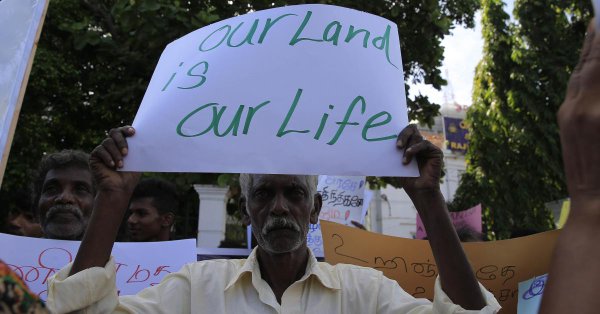Image: A Sri Lankan Tamil man holds a placard during a protest in Colombo on August 21, 2018, demanding the release of lands still occupied by the military. © 2018 Eranga Jayawardena/AP Photo.
Create Consultative Process to End Military Occupation.
“All those displaced during Sri Lanka’s brutal civil war are entitled to return to their homes,” said Meenakshi Ganguly, South Asia director. “Despite repeated pledges by the authorities, the military has been frustratingly slow to restore land to its rightful owners.”
The report is based on over 100 interviews between August 2017 to May 2018 with members of affected communities, activists, local officials, and lawyers. It looks into cases of military occupation and land release in 20 areas in six districts, primarily in Sri Lanka’s north and east.
The three-decade civil war in Sri Lanka ended with the decisive defeat of the separatist Liberation Tigers of Tamil Eelam (LTTE) in May 2009. Large areas, including those previously held by the LTTE in the north and east, came under military control. At the end of the war, some 300,000 people ended up in a military detention camp.
While the administration of then-President Mahinda Rajapaksa released some land to its original owners, the military retained control over large areas for military but also non-military purposes, such as agriculture, tourism, and other commercial ventures.
The new government, led by President Maithripala Sirisena, took some steps to release civilian land held by the security forces. At the United Nations Human Rights Council in October 2015, the government promised to address conflict-related issues, including returning land to its original owners. However, the government’s response has fallen far short of its promises. On October 4, 2018, the president ordered the state to release all civilian land by December 31, 2018.
The military has also retained control of land it previously announced it would return. For instance, in April 2017, the navy responded to protests by displaced communities from the Mullikulam area in Mannar by announcing it would release 100 acres of the land that security forces had been occupying. More than a year later, people are still waiting.
“Now there is no war,” said Francis Crooss, a village elder. “It’s now peacetime. So why can’t we go back home?”
State agencies have exchanged properties without releasing the land to civilians. In Pallimunai in Mannar, land belonging to residents displaced since 1990 was occupied first by the army and then the police. At war’s end, the police promised to release their land and homes, but instead, the navy took control.
“We’ve been made refugees in our own village,” said Helena Perera, one of the residents.
All three major ethnic communities in the country – the Sinhalese, Tamils, and Muslims – are affected by military occupation of land in the north and east. However, the vast majority of cases impact the Tamil community.
Human Rights Watch documented a number of cases in which properties were destroyed while held by the military after the war, including Hindu temples, churches, mosques, and Buddhist shrines.
Government authorities have also carried out land grabs since the end of the war. In July 2010, the military forcibly evicted residents of Ragamwela, Panama, in southeastern Ampara district. In November 2011, 200 soldiers arrived in Ashraf Nagar village in Ampara district and demanded that all its occupants leave. In such cases, the security forces set up military camps or used the land for other purposes, including commercial use.
The government’s failure to establish a uniform policy on resettlement remains a critical problem, Human Rights Watch said. Some displaced families did not receive proper resettlement assistance when they returned to formerly occupied lands. The government transferred others from displacement camps, but they then entered into other forms of displacement, such as living with friends and relatives, or moving to other camps closer to their original properties, which the military still occupied. Those resettled more than once were denied full resettlement assistance when their land was eventually released.
A 70-year-old fisherman from Myliddy said his family had moved 24 times in 27 years until the military released his property in July 2017. But without resettlement assistance, he is severely in debt. “We hope the government will at least help us restart our lives this one last time,” he said.
Partial releases pose particular problems for returnee communities. Military control of neighboring areas hinders access to services and jobs, and heightens fears of surveillance and harassment by soldiers.
Establishing ownership of land where multiple displacements have occurred over decades is difficult, Human Rights Watch said. But instead of leaving it exclusively to the military, the government should urgently set up a transparent and consultative process, including displaced communities, to establish land claims and restore civilian ownership.
“The government has adopted an arbitrary, piecemeal approach to land returns, which is fomenting deep distrust among communities wary that the military is still in charge,” Ganguly said. “It should address rights violations and provide remedies to end the distress of those who have long suffered because of the military’s occupation of land.”
